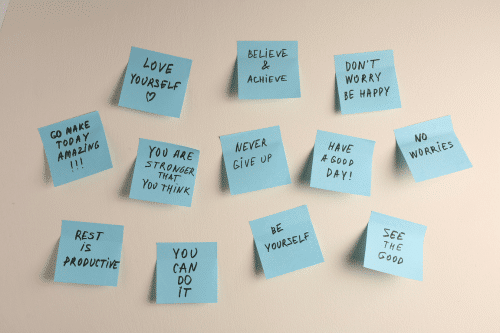Affirmations for Recovery: Harnessing the Power of Affirmations
Affirmations for recovery are a powerful tool in the recovery journey. These positive affirmations can support individuals in addiction recovery by helping shift negative thinking into positive beliefs. At Opus Treatment in Orange County, we use affirmations as a key part of the recovery process, offering encouragement, emotional support, and a strong foundation for lasting change.
The Power of Positive Affirmations
A simple statement like “I am strong enough to stay sober” can make a real difference. Positive thinking doesn’t rely on wishful thinking—it encourages new thinking patterns and supports future behavior. Affirmation statements can provide a source of strength, reduce negative emotions, and guide actions in daily life. These powerful statements are a source of inspiration for those walking the path to recovery.
Scientific Evidence from Positive Psychology
Research in positive psychology shows that positive attitudes and daily affirmations improve mental health, reduce stress, and increase cognitive function. Studies suggest affirmations stimulate reward centers in the brain, improving emotional response and creating long-term changes in behavior. Affirmations are not just motivational—they’re tied to real improvements in physical health and emotional health during recovery from addictions.
How Affirmations Influence Recovery
Affirmations for recovery can support addiction treatment by addressing negative beliefs, replacing them with uplifting statements and recovery mantras. By targeting the subconscious mind, these positive phrases shape future actions and help break cycles of addictive behaviors. When paired with behavioral therapy or SMART Recovery, affirmations become even more effective in reshaping self-talk and promoting healthier self-image.

Tailored Affirmation Lists for Recovery
Affirmations should match each person’s experience. Personalized affirmations allow for deeper meaning and connection, especially when used with a Recovery Journal or affirmations with gratitude journaling. These lists help individuals stay grounded in the present and focused on achievable goals.
Daily Affirmations for Men
- “I have the strength to overcome my addictions.”
- “I am committed to sobriety and my recovery goals.”
- “My actions support a healthy, sober life.”
- “I build supportive relationships that uplift me.”
Daily Affirmations for Women
- “I deserve peace of mind and a happier life.”
- “I choose healing, every day.”
- “I am worthy of love and respect.”
- “I nurture healthy relationships in my daily life.”
Affirmations for Sobriety
- “Each day, I take steps on my path to sobriety.”
- “I have a strong spirit and the ability to change.”
- “Sober affirmations remind me of my progress.”
- “I embrace a sober life with clarity and intention.”
Self-Care Affirmations
- “Taking care of myself supports my long-term sobriety.”
- “I allow myself to rest and recharge.”
- “Positive behaviors lead to a more healthy life.”
- “Self-care is part of my commitment to recovery.”
Crafting Personalized Affirmations
The best affirmations reflect personal values and challenges. A simple phrase like “I am healing” or “I trust my growth” can become a key component of someone’s routine. Consider using a Recovery Journal to reflect on your favorite affirmations, and revisit them during times of difficult emotions.
Techniques for Creating Effective Affirmations
To write powerful affirmations:
- Focus on positive emotions
- Use present tense
- Avoid negative phrasing
- Keep it short and specific
- Choose words that match your recovery goals
Repeating these encouraging statements during meditation practices or alongside deep breathing can deepen their impact.
Overcoming Skepticism and Doubt
Some people doubt that affirmations simple can influence change. But even small shifts in mindset matter. Changing cognitive distortions and negative habits starts with how we talk to ourselves. Over time, affirmations for recovery can lead to more confident choices and stronger mental health.

Incorporating Affirmations into Daily Routines
Adding affirmations to your daily schedule is easy. Say them aloud, write them on sticky notes, or repeat them during daily meditation. Use them after group therapy, during quiet time, or before bed to reinforce new thought patterns.
Setting a Routine for Affirmation Practice
- Start each morning with three affirmations
- Repeat one during stress or cravings
- End your day with a gratitude-based affirmation
- Track your progress with a Recovery Journal
Using Affirmations for Long-Term Recovery
In long-term recovery, affirmations help maintain momentum. They support sustained recovery by reinforcing your commitment, reducing anxiety, and offering a mental reset during challenging moments. Use them to stay connected to your “why” throughout everyday life.
Building Resilience and Self-Love
Affirmations build emotional strength by encouraging personal growth and self-worth. In alcoholism recovery, this mental support is just as important as physical healing. When paired with addiction therapy methods, affirmations contribute to a full recovery strategy.
Affirmations for Building Resilience
- “I grow through each challenge I face.”
- “I can handle whatever comes my way.”
- “My progress is real and worth celebrating.”
- “I learn and evolve every day.”
Developing Self-Love through Affirmations
- “I love who I am becoming.”
- “I speak kindly to myself.”
- “I deserve a life filled with peace and purpose.”
- “I forgive myself and move forward.”
Practical Advice for Sustaining Recovery
Combine affirmations with addiction counseling, art therapy sessions, and supportive networks. Affirmations don’t replace evidence-based addiction treatments—they strengthen them. Add affirmations to your list of action items, pairing them with journaling, therapy, and routines that help reduce anxiety levels.
Integrating Affirmations with Other Recovery Strategies
- Use affirmations during affirmation during mindfulness meditation
- Pair them with tools like Ria Health or alternative recovery methods
- Listen to a recovery podcast while journaling affirmations
- Share affirmations with supportive people in your network
Empowering Long-Term Recovery with Affirmations
Affirmations serve as a source of inspiration for people moving from addiction to recovery. Whether you’re journaling, meditating, or meeting with a mental health counselor, they offer grounding support. Each positive affirmation reinforces your commitment to recovery and strengthens your path to a healthier life.
Conclusion: Embracing a Fulfilling Sober Life
At Opus Treatment, our approach to treatment encompasses mental, emotional, and behavioral health. Affirmations are a beautiful tool that promote healing, growth, and hope. Whether used alone or with addiction treatment services, they support your journey to a meaningful and fulfilling life in recovery.
Frequently Asked Question's
Yes, affirmations support addiction recovery by reinforcing positive beliefs and reducing negative thinking patterns. When used consistently, they help rewire the brain, improve emotional health, and build motivation. Affirmations are most effective when combined with evidence-based addiction treatments like therapy and support groups.
It’s helpful to repeat affirmations at least twice a day—once in the morning and once at night. You can also use them during stressful moments or emotional triggers. Adding affirmations to a daily routine, journal, or meditation practice helps strengthen their effect over time.
Yes, creating your own affirmations can make them more meaningful. Focus on simple, positive statements in the present tense. For example, instead of saying “I won’t relapse,” say “I am committed to recovery.” Personalized affirmations are more effective at guiding future behavior and improving your mindset.
It’s common to feel doubt early in the recovery journey. Keep repeating the affirmations anyway. Over time, these positive statements begin to reshape your thoughts, reduce negative emotions, and support long-term sobriety. Belief often grows with consistency and support from others in recovery.




